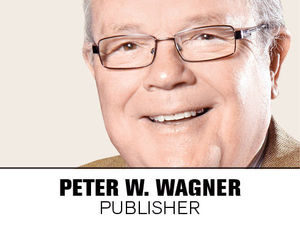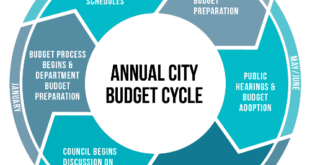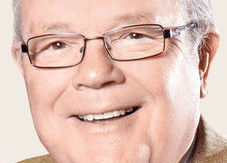High School student Johnny Jenkins, the local jeweler’s son, hit two bases-loaded home runs during the school’s baseball game last Friday. But most of the locals won’t know about Jenkins’ batting proficiency until the paper comes out next Wednesday. The community appreciates the local team, but few actually attend the games.
 On Monday night the city council voted down the much-hoped-for improvements to the swimming pool. But most folks won’t know why until they read Wednesday’s paper. The council thought it was good idea, but the high-cost remodeling estimates couldn’t be fitted into the town’s shrinking budget.
On Monday night the city council voted down the much-hoped-for improvements to the swimming pool. But most folks won’t know why until they read Wednesday’s paper. The council thought it was good idea, but the high-cost remodeling estimates couldn’t be fitted into the town’s shrinking budget.
Early Tuesday morning the local Wilson’s Men’s & Women’s Clothing Store decided to hold a 50th anniversary sale. Wilson’s is offering savings up to half-off, but few residents saw the Facebook notice and traffic has been slow. But business will increase once the paper and the store’s half-page ad come out on Wednesday.
Newspapers are the lifeblood of every community — from those of a few hundred population to thousands of residents. The hometown newspaper is the only media that consistently provides all the breaking local news and everyday activities information in neatly organized detail.
The local radio station doesn’t. There isn’t enough time in the on-the-hour five-minute newscasts to cover everything, let alone provide the details.
The nearby metro television stations don’t. They just give token coverage to the smaller communities in the hope they’ll enhance viewership and perhaps get some occasional advertising.
The independent internet sites don’t. Most are heavily biased and more interested in selling their political position. Besides, the majority are not properly staffed to cover all the news important to the community.
Meanwhile, the already mammoth cable system doesn’t. Most are only interested in retransmitting provided programing, finding ways to further increase their monthly fee and are not staffed to be a news-gathering organization.
So, it’s the printed paper, and only the printed paper, that week after week provides the much-needed news. And in the process it is that same paper that creates community, consensus, citywide cooperation, local commitment and the very lifeblood that keeps the city alive.
But the current state of local print journalism is questionable. The impact of COVID-19 has been devastating on newspapers and free circulation shoppers.
According to a recent study by the University of North Carolina Hussman School of Journalism, more than one-fourth of America’s newspapers, that’s 2,100 papers, have closed their doors since 2004. Of that number more than 2,000 have been non-dailies. While 70 have been daily publications.
The early belief that digital websites might fill the void has not proven true. Most newspaper digital sites, although they attract a growing readership, have not begun to provide even close to the same advertising revenue as the once revered printed paper.
Perhaps the future will provide exciting new business models such as foundation-supported nonprofit publications, the newspaper industry being underwritten by government funds bills like the proposed H.R. 7640 or papers supported exclusively by subscription revenue. But whatever happens I can only hope the publishers will always first consider how the publication can best serve the community as a whole and their unique reader base before making any change.
Meanwhile, I continue to stress the importance of selling ideas, promotions, special sections, packages and community support pages in our current situation.
Promotions because advertisers need fresh, exciting, well-planned and executed locally produced campaigns to draw customers — both local and from outside the territory — into their businesses advertising in your publication.
Special sections lead the list because they bond your publication with the community and with your readers. More importantly they often are unique subject keepsake sections that give local advertisers an ideal opportunity to blend their sales message with the specific message of the section. Keepsake sections are good investments for advertisers since they often are held onto and shared within the family and community for years to come.
Multi-week or monthly packages are important because most business people are hesitant to make many decisions during our current trying times. To get a longtime commitment now can result in exceptional income for weeks or months to come. It’s also a well-respected fact that consistent advertising is always a better investment for the client.
Special pages add to the mix because many advertisers want to keep their names in front of the local public but, with COVID, have limited dollars to spend. The opportunity to participate in a salute to veterans, agriculture, the local football team, Girl Scouts or any hometown group or event lets them feel good while they promote their business.
And most important, ideas! Advertisers need all the help they can get to stay in business during this COVID crisis and newspapers and shoppers need all the advertising they can get for the same reason.
But saving the community and hometown paper is more than just continuing the flow of local information. It’s about preserving what is the voice of the people and the watchdog of those who govern our democracy.
And that is why I still believe in the future of the printed word.
 Nevada Press Association The best in Nevada journalism since 1924
Nevada Press Association The best in Nevada journalism since 1924




